Blanch, starring Cate Blanchett as herself, is detaining entertainment on the refugee crisis

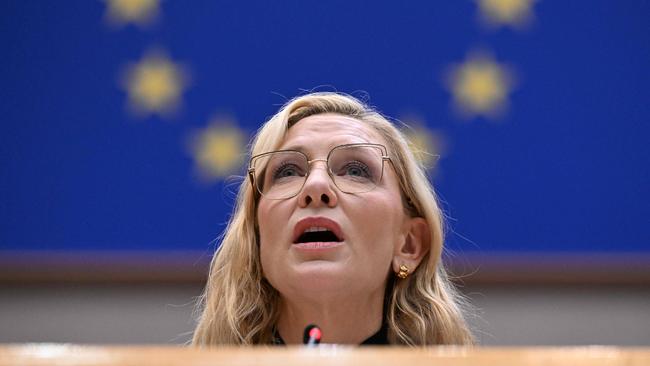
I confess that only now have I come to appreciate Blanchett’s artistic genius. In my ignorance, I had long thought she was overrated. The only thing I will say in my defence is that she has had her share of shockers, particularly her performance in the 2008 film Happy Little Vainglorious, based on the Rudd government’s 2020 Summit [of 2008]. Undoubtedly, she too cringes when reminded of her line: “It’s a beginning, I believe really strongly, of a long and meaningful relationship between artists and the government, not as an adjunct to, but as a fundamental aspect of, society.”
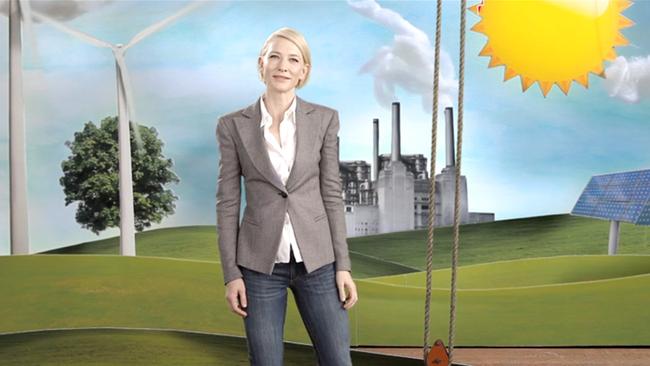
Bad as that was, her performance just three years later as “Carbon Cate’’ [in advertising promoting the Labor carbon price] was far worse. “Finally doing something about climate change,” she proclaimed in a comically implausible line purporting this could be achieved by a tax. Her lashing out at the critics with statements such as “There is a societal cost of increased pollution and that’s what I’m passionate about as a mother” and “I can’t look my children in the face if I’m not trying to do something in my small way and to urge other people’’ only compounded the ridicule. Few were surprised when Gillard Productions went under just two years later.
But her latest project has turned all that around. Blanchett’s expansion into the roles of director and screenwriter has given her full artistic control. Blanch is the culmination of those talents. Combining the themes of elitist hypocrisy, self-righteousness, and the fallacy of celebrity omniscience, Blanchett delivers a cinematic masterpiece. (To avoid confusion I will refer to the film’s protagonist and director as Cate and Blanchett respectively).
Blanch is the story of Cate, an actress and UNHCR goodwill ambassador whose sense of self-importance ideally complements both roles. The opening scene features her arrival in Brussels, Belgium. The occasion is her address to the European parliament, its members eager to hear from their distinguished guest. You know, birds of a feather and all that.
The subject of her speech is the plight of refugees. As befitting a luminary who wants the world to know she empathises with the downtrodden and the disempowered, she does not take her seat until a gloved footman manoeuvres the chair for her. Then begins her address. Effortlessly regurgitating platitudes as she talks of displaced persons, she urges EU members to “focus on their protection and not on fortifying borders”.
This is the point where viewers will marvel at Blanchett’s directorial and authorial abilities as she perfects the art of self-parody. Think of Ricky Gervais’s The Office but imagine an outpouring that is tenfold more excruciating. “Complex situations,” this exceptionally insightful popinjay tells the audience, “require complex solutions”. Furthermore, they “require dialogue”.
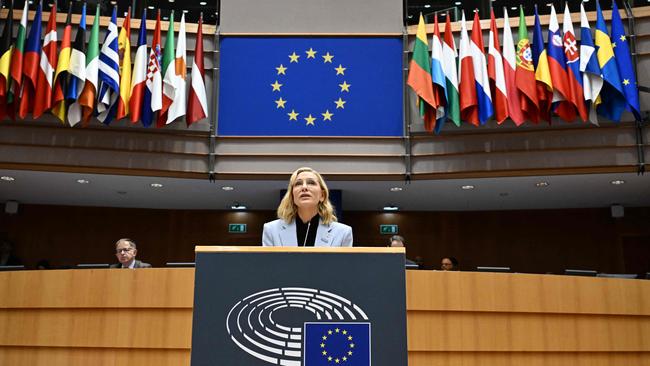
In Cate’s world there are no opportunistic economic migrants, only refugees. “They want to return home to their people, their land,” she assures us. To insist otherwise is to subscribe to a “dangerous myth”. For good measure she quotes the poetry of Warsan Shire. “No one leaves home unless home is the mouth of a shark,” she declares. Who knew they long to touch the green, green grass of home.?
She also asks that decision-makers spare a thought for the “young men so often demonised in the media”. Young men, like the murderers, domestic violence offenders, rapists and paedophiles among the 81 immigration detainees released in the community this week courtesy of the High Court. We can only hope that the millions we are likely to pay them in compensation mitigates the “shame and regret” that Cate feels for Australia’s border-protection policies.
So considerate is she that she frets even for Australia’s immigration detention officials, warning of the “psychological damage to those guarding” refugees. She has a point. Imagine being landed the job of accompanying a violent Iranian asylum-seeker from Manus to Australia after he botched his DIY penis enlargement operation.
Incidentally, can anyone point me to Cate’s pleas for the mental wellbeing of border-protection personnel, many of whom were traumatised by mass drownings, explosions, and having to retrieve bodies, during the people-smugglers’ golden era of 2008-13? But I digress. In any event the adoring members of the EU parliament would never consider asking their guest such impertinent questions, and Cate departs the building to rapturous applause.
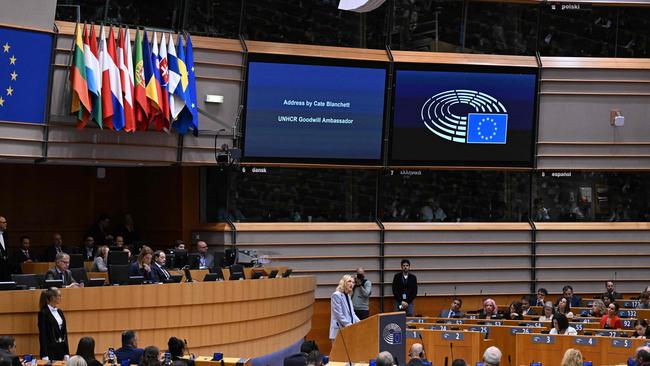
The ending is not a happy one for the protagonist, although it will delight viewers. Reports later emerge that Cate, contrary to her official stance, is very big on fortifying borders, at least when it comes to protecting her personal space. A pesky observer digs up a Daily Mail article from 2022 which reveals the actress paid £1.5 million [currently $2.9m] for an additional property surrounding her mansion in East Sussex, UK. Just one excerpt will suffice: “Importantly for Miss Blanchett’s seclusion, the farmhouse came with close to 100 acres [45ha] of pasture and woodland, and is reached only by a long access lane which now has new gates halfway down.”
Inspired by their champion’s EU speech, asylum seekers descend en masse to chez Cate. Enraged by the intrusion, she rings the local constabulary to demand they evict them, only to be told politely but firmly by a police inspector that refugees too have human rights. In the closing scene, the narrator suggests mockingly that Cate, given her love of poetry, should follow the example of Emma Lazarus’s sonnet The New Colossus. “Repeat after me, Cate,” he says: “Give me your tired, your poor/Your huddled masses yearning to breathe free.”
I commend this film to you. Blanchett can now rest easy knowing she finally has the recognition which this country has long denied her. “The worst thing for us as an actor in Australia is getting in the back of the cab and a cabbie asking ‘what do you do’, she said in July. “Because you think, ‘Oh, God.’ You’re constantly having to fight for the space or to justify the fact that you have the right to actually be an artist in Australia.”
Identify as an artist all you want, Ms Blanchett. In our own way, we find your performances most entertaining.

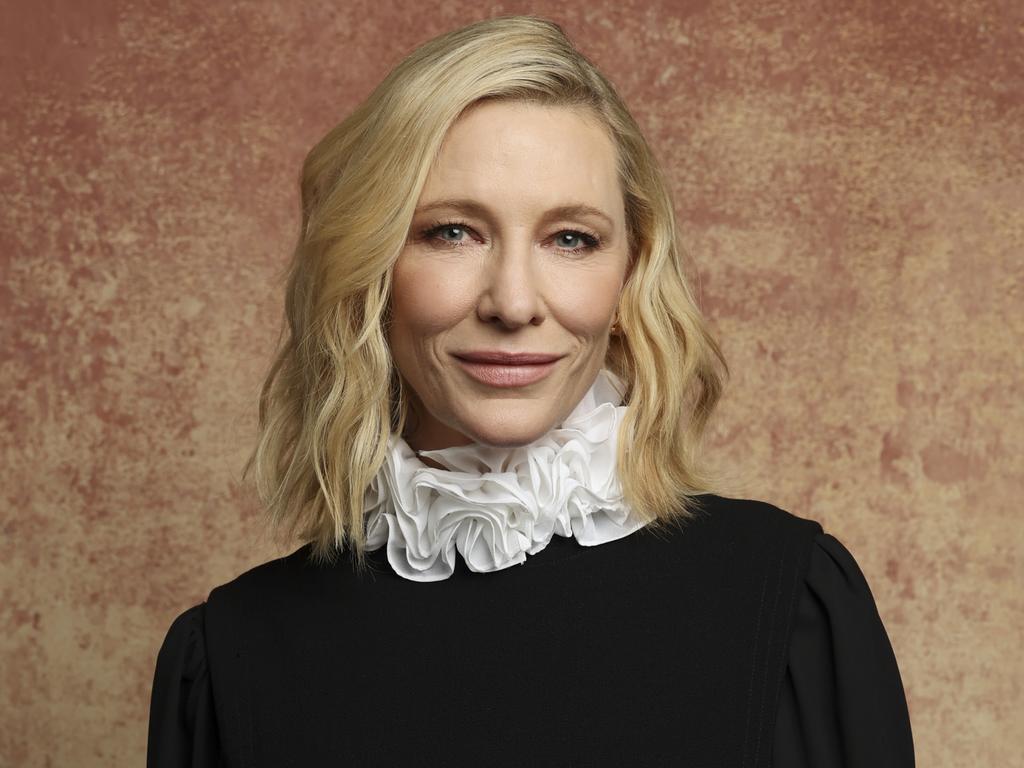




The next Oscars will not be held until March 2024, but already I am calling it. Blanch, the eponymously named mockumentary starring Cate Blanchett as herself in the role of a haughty and sanctimonious UN ambassador, will win best picture. So magnificent is this film that Blanchett will likely take out the awards for best actress, director and screenplay.